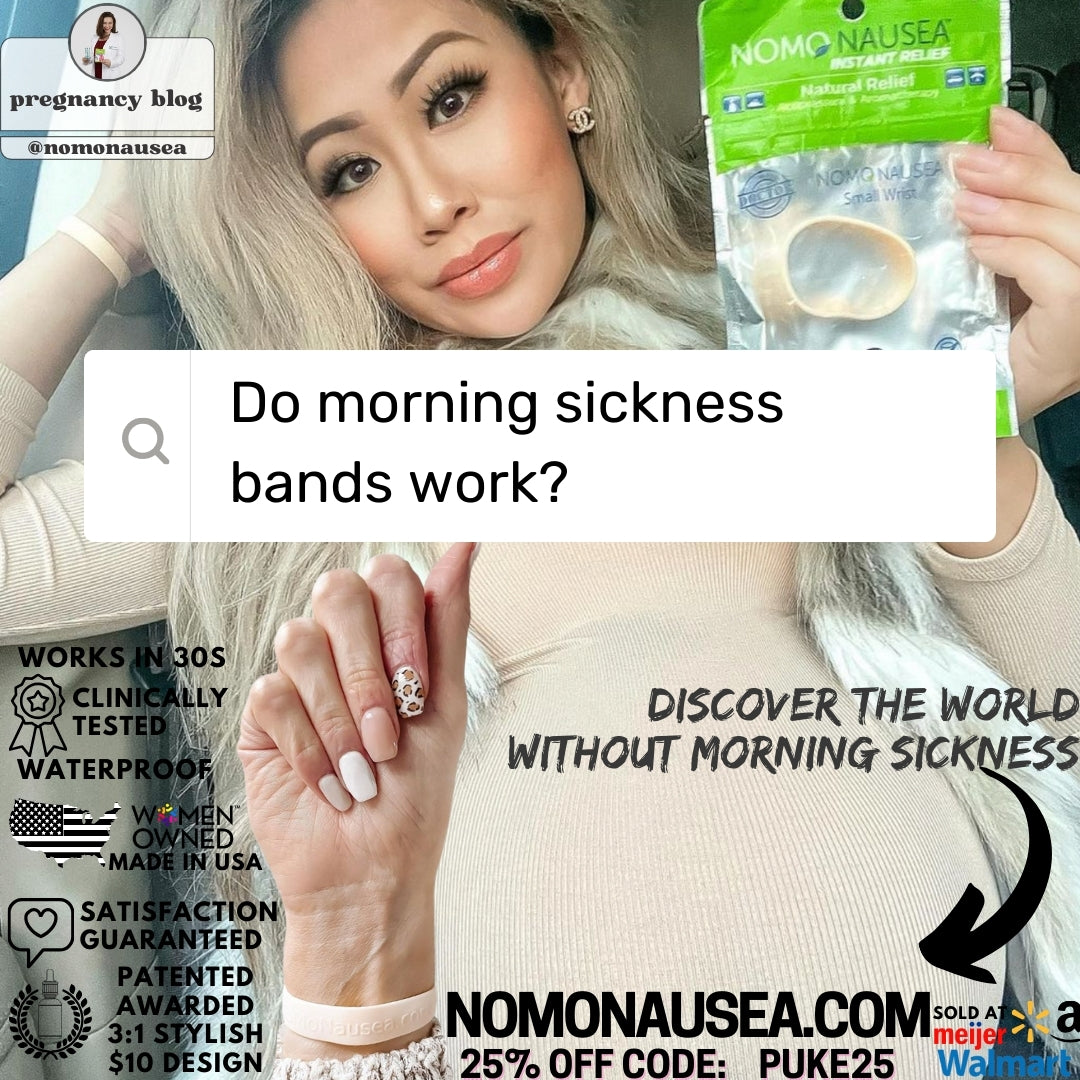
Do Morning Sickness Bands Really Work? A Comprehensive Look at Various Remedies
Do Morning Sickness Bands Work?
About 80% of expecting moms experience morning sickness. If you find yourself in this category, you may be wondering what can help you get some much-needed relief. Acupressure bracelets (such as NoMo Nausea Bands and similar products), are one of the most popular options for drug-free relief, but you may find yourself wondering if they really work.
This article will help you settle that question, but since there are a lot of myths surrounding pregnancy nausea and how to get rid of it, we’ll also take careful look at various proposed remedies and the evidence for them.
What is Morning Sickness, Really?
Morning sickness is more properly known as “nausea and vomiting of pregnancy,” especially because (as you may already have discovered) it does not happen only during the morning. As unfortunate as that may be, it is good to know that it is a normal condition that affects most women, especially during the first trimester of pregnancy, though some (including me!) may experience it all the way through the third trimester.
While the cause of morning sickness is not yet perfectly understood, the Cleveland Clinic explains that it “may be caused by low blood sugar or the rise in pregnancy hormones, such as human chorionic gonadotropin (HCG) or estrogen.”
Extreme Morning Sickness
Most women experience mild to moderate symptoms that tend to decrease over time, but up to 3% suffer from the most extreme kind of morning sickness, known as hyperemesis gravidarum (HG). Women suffering from HG may experience vomiting more than 3 times a day, become dehydrated, and lose weight. While regular nausea and vomiting during pregnancy are not usually a cause for concern, you definitely want to reach out for help to your medical provider if you think you are suffering from HG.
What are the Most Popular Remedies for Morning Sickness Besides Nausea Relief Bands?
Besides nausea relief bands, which are the focus of this post, the most common remedies for morning sickness you’re likely to hear about are the following:
- Anti-emetic drugs
- Dietary changes and supplements
- Products containing ginger
- Aromatherapy
We’ll go in-depth into these various options in other articles on the BlissBlog, but for the moment, here are the highlights:

Anti-Emetic Drugs
Types: There are many over-the-counter and prescription anti-nausea medications, some of the most popular being antihistamines like dimenhydrinate (Dramamine) and meclizine (Bonine), as well as others like scopolamine (Transderm Scop) and ondansetron (Zofran).
Side Effects: These drugs have been shown in clinical studies to reduce nausea and vomiting of pregnancy, but they all have their side effects. These vary depending on the drug and are typically minor, but may include drowsiness, blurred vision, agitation, confusion, dry mouth, and in some cases even delusions of persecution and seeing, hearing, or feeling things that are not there. Understandably, many expecting mothers try to avoid them during pregnancy, preferring more natural ways to manage morning sickness.
Dietary Changes and Supplements
What you are able to keep down may be affected by what (and how) you eat. To reduce your morning sickness, the Cleveland Clinic recommends avoiding fatty or spicy foods and instead trying “bananas, rice, dry toast, plain baked potato, gelatin, broth, eggs, tofu, or applesauce.” Try starting your morning with a few crackers or toast to help settle your stomach, and eat 5 or 6 small meals instead of 3 large ones, incorporating protein to balance those carbs when possible. Finally, to avoid dehydration with vomiting it is also important to drink plenty of fluids, especially water (though you may find it is helpful to consume your solids and liquids separately). Consider adding drinks or foods with real ginger to your diet, and taking vitamin B6. Since different foods affect people differently, you may want to consider keeping a nausea diary to identify your own triggers and learn what eating patterns help you most.
Side Effects: So long as you keep a balanced diet, you should not experience any side effects. However, while this is a way of managing how much morning sickness you experience daily, it won’t help much with getting rid of it when it does show up.
Products Containing Ginger
Types: Because ginger is such a popular recommendation for relieving morning sickness, products containing it deserve their own category. Store-bought products include chews, drops, lollipops, gum, ginger tea, ginger ale, ginger supplements, and more. You can also get real ginger at the grocery store and make yourself something nausea-friendly.
A study in the journal Integrative Medicine Insights concludes that while greater study is needed “best available evidence demonstrates that ginger is an effective and inexpensive treatment for nausea and vomiting and is safe.”
Side Effects: Ginger is generally considered safe, but the Mayo Clinic mentions that while most research suggests ginger is safe for pregnancy, “there's some concern that ginger may affect fetal sex hormones.” Consult with a medical professional before consuming ginger in large quantities or in supplement form.
Aromatherapy
Types: Inhaling essential oils is a popular recommendation for morning sickness. The most popular oils for this purpose include lavender, chamomile, peppermint, lemon, and ginger. While many women find them helpful, their usefulness may be due in part to the placebo effect.
